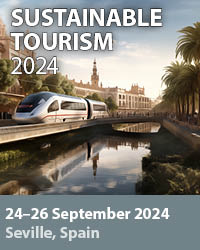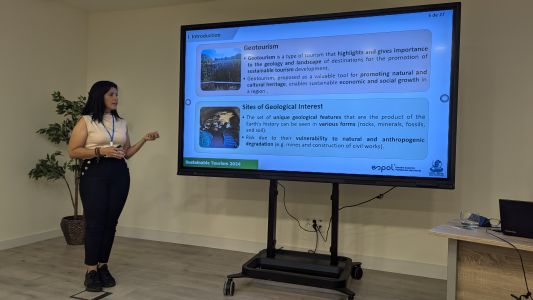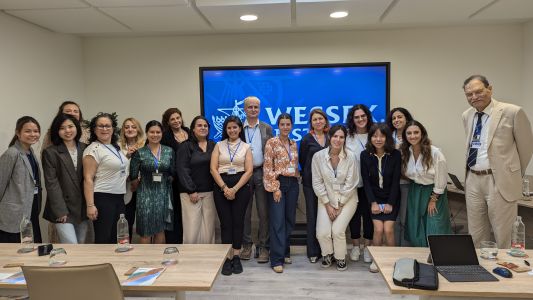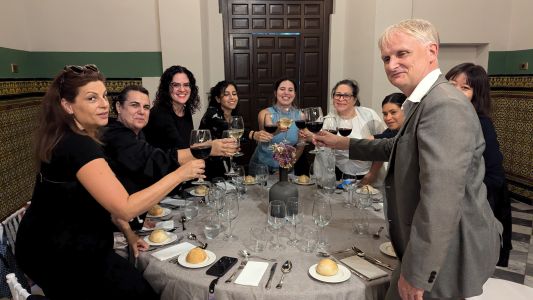Sustainable Tourism 2024
11th International Conference on Sustainable Tourism
![]()
24–26 September 2024
Seville, Spain
Overview

The 11th International Conference on Sustainable Tourism took place in Seville, Spain. The Conference was organised by the Wessex Institute of Technology (WIT), UK, represented by its Academic Director, Dr Stavros Syngellakis.
The conference series, which started in 2004 in Segovia, Spain, is well-established and always attracts a wide international spread of delegates. The diverse topics covered by the conference often require the collaboration between different disciplines in order to arrive at optimum outcomes; they include studies of tourism strategies and sustainable business models, sustainable tourism implementation, various types of tourist activities, destination management, environmental impacts and many others.
Opening of the Conference
The meeting was opened by Stavros who welcomed the delegates and then proceeded to point out that the series success can be attributed to the realisation that, today, tourism is an important component of development, not only in economic terms but also for broader human knowledge and welfare. Tourism is an activity accessible to a growing number of people leading to a greater importance for transport and communication links. This conference aims to promote ways of protecting the natural and cultural landscape through the development of design and management strategies which minimise the adverse effects of tourism. This can be achieved through the involvement and active collaboration of planners, developers, engineers, scientists and the society as a whole.
Stavros then gave a brief overview of the present WIT activities. He pointed out its origins in the pioneering work for the development of a new numerical technique, the boundary element method (BEM). This method was developed into a powerful analysis tool for the solution of critical industry problems. It is applied by itself or in combination with other analytical techniques to provide solutions against engineering failures such as, for instance, sea or atmospheric corrosion and fatigue fracture.
The scope of the institute was subsequently broadened to provide knowledge transfer opportunities in other science and engineering areas as well on the ecology and the environment. Conferences remain WIT’s main instrument for knowledge transfer; they provide opportunities for social interaction, establishing contacts, direct exchange of views, information and advice plus some enjoyable moments during social events such as the dinner and other organised activities.
The Institute also continues to organise short courses in a wide variety of topics. It welcomes proposals from academics and engineers, experts in almost any field who wish to disseminate their knowledge. Another way in which WIT achieves dissemination of knowledge is by the publication of papers from conferences through its publishing arm, WIT Press.
The institute, in partnership with other academic institutions, awards annually two medals to prominent scientists in their fields. The George Green medal, jointly awarded with the University of Mississippi and supported by Elsevier, to a researcher having made significant contributions to the development of the boundary element method. The Prigogine medal was instituted with the University of Siena to the memory of Ilya Prigogine, Nobel winner in Chemistry, pioneer in linking thermodynamics to ecological processes. It is awarded annually to a leading scientist in the field of ecological systems who has been deeply influenced by Prigogine’s work.
Professor Carlos Brebbia was the founder and embodiment of the institute until his death in 2018. He pioneered the development of the boundary elements as a powerful analytical tool. His passing away was a great loss to everyone working with him but also to the wider academic community. His memorial was attended by many friends, fellow academics most of them, who referred to his personality and his achievements.
Invited Speakers
There were a series of invited lectures on advanced topics of research and applications, as follows:
- Developing sustainable indigenous tourism based on education - a comparison between Japan and Canada, by Dr Lorenz Poggendorf, Toyo University, JAPAN
- Using agriculture to improve and increase the sustainable tourism industry in Idaho, USA, by Dr Robert Mahler, University of Idaho, UNITED STATES
- The future of competitive advantage in the hotel industry: ESG initiatives as a key differentiator, by Dr Eleni Didaskalou, University of Piraeus, GREECE
- Changing faces of Croatian tourism, by Dr Mauro Dujmović, Juraj Dobrila University of Pula, CROATIA
A number of themes were pursued by the contributors to this conference. These include:
Sustainable tourism implementation; tourism strategies and sustainable business models; destination management; cultural, heritage and gastronomic tourism; tourism and the environment.
There were numerous occasions for holding informal discussions during the coffee breaks and the complimentary lunches provided.
Conference Publication
Papers presented at this conference will appear in Vol. 263 of the WIT Transactions on Ecology and the Environment (ISSN 1743-3541). Papers presented at the meeting will be available Open Access in the eLibrary of the Wessex Institute (https://www.witpress.com/elibrary) from where they can be freely downloaded by any interested parties.
ISAC Dinner
The meeting of the International Scientific Advisory Committee (ISAC) of the Conference took place over dinner in the Restaurant La Taberna De La Dehesa serving traditional local cuisine. At the meeting, members of the committee were encouraged to advise WIT on the evolution of the conference by making suggestions for new topics, ISAC membership and future venues.
Conference Dinner
The Conference dinner took place at Restaurant Los Seises Seville set in a restored 16th-century palace in the old city of Seville. The participants could enjoy the best contemporary Andalusian cuisine, including an exceptional range of traditional starters. The restaurant offered beautiful views over the Seville Cathedral from its rooftop terrace. The evening was particularly appreciated by the participants.
Closing of the Conference
The conference was closed by Dr Stavros Syngellakis, who thanked the delegates for attending and hoped that they would consider attending the next conference in the series.




 Wessex Institute
Wessex Institute